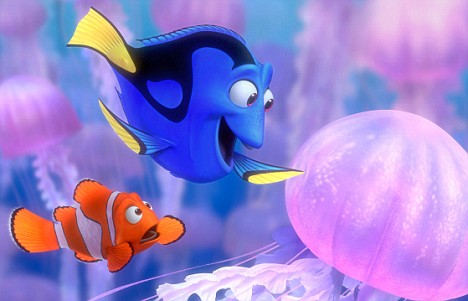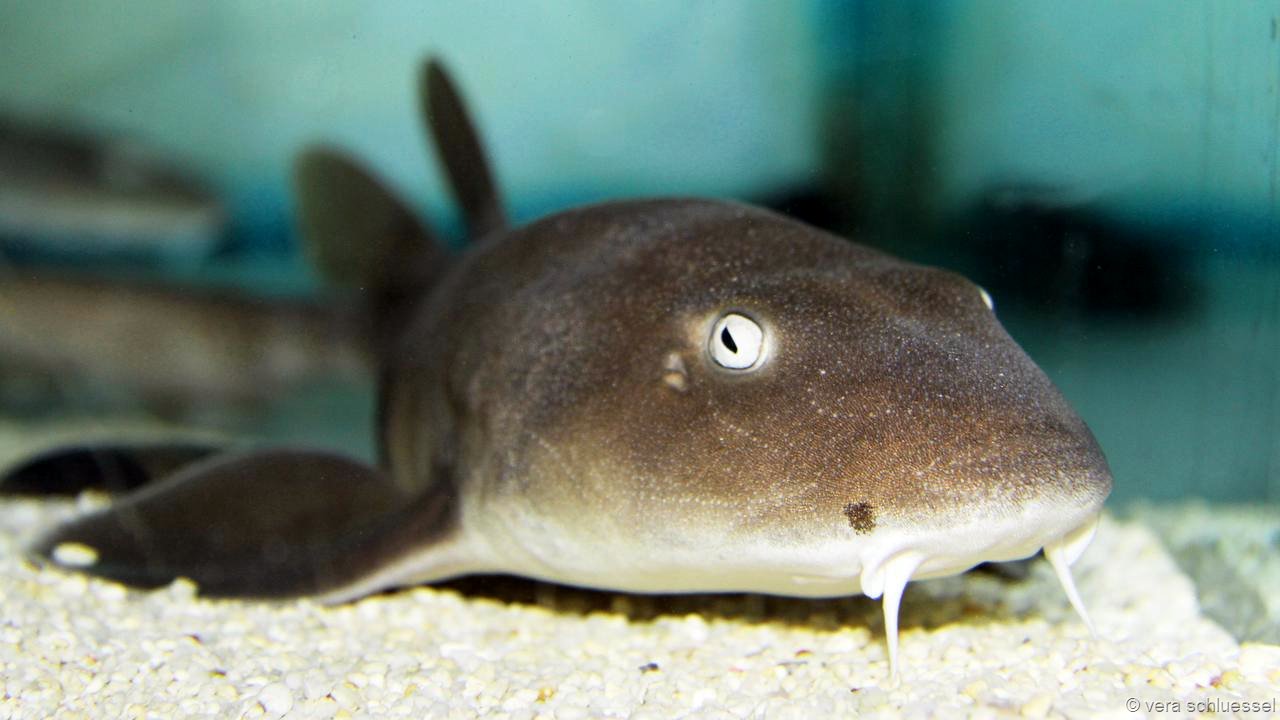'Memorable' and 'smart' like sharks
Most people think that only highly evolved species like monkeys, dogs, cats, birds or people have good memories. But a recent study by the University of Bonn (Germany) shows that even water-dwelling species that appear before dinosaurs have superhuman and intelligent memory.
Superhuman memory and shark intelligence
We often hear funny stories about the short term memory of fishes, that they only remember something in . 3 seconds! This story probably comes from the "girl" Dory fish in Finding Nemo. But in fact, this is not true. Some studies show that fish have relatively good memory.

Dory fish with short-term memory in the famous animated film Finding Nemo
For example, in aquaculture, fishermen have trained their fish by striking (or emitting a specific sound) before feeding them . Gradually later, I heard that fish are gathered near the feeding area. Based on this, Israeli researchers have "trained " the fish to remember a particular sound. They were then released back to the sea. About a time later, they played the sound again and noted the return of the fish. After 4 - 5 months, there are still some adults returning to the source of the sound source.
However, the results of the later study of the University of Bonn not only show that sharks are capable of "remembering" but also smarter than what we think of them.
Identify shapes
This study was carried out by Dr. Vera Schluessel in collaboration with fellow Theodora Fuss on Chiloscyllium griseum, a carpet shark, which lives in western Indonesia with a length of about 60 cm. . Theodora conducted three different experiments to measure the memory and intelligence of juvenile fish.

Carpet shark species used in experiments
The first experiment is the ability to recognize images . And they are not " easy-to-see " images as we often see in some animal IQ experiments. Theodora first trained a group of sharks to identify triangles, by feeding each time they touched their nose on the corresponding position on the wall. Besides, Theodora also trained another group, but in square shape.
Later, she checked whether they could recognize aerial squares or triangles, but in another structure - the Kanizsa structure. These are pictures that do not draw full sides of polygons but only circles like Pacman games, they choose the number of matching angles and appropriate placement to help the human brain "draw" itself. polygons are not real (in imagination). Some other images, discrete Pacman fragments are not included in the test.

The illusion of squares and triangles is created from puzzle pieces Pacman
Surprisingly, Theodora's sharks are also capable of reproducing images similar to human brains . They picked exactly the pictures with the pieces Pacman arranged in line and created a meaningful image. With this ability to recognize optical illusion ( shark illusion), the shark is officially ranked in the same category as the highly evolved species such as dogs, cats, monkeys and owls.
The ability to identify this optical illusion from incomplete pieces, can be explained to help them increase their ability to survive in nature . By the way, the carpet-dwelling shark that lives on the bottom of the sea can imagine the prey hiding under the sand, or help them recognize predators more remotely, when the image of them is only the shadow is dimmed under the water or hidden behind coral reefs.
Not easy to be fooled
Next, Theodora conducted a second experiment to see if the sharks could detect the squares hidden behind the diagonal lines above them, as well as distinguish the square with the rhombus on the same Is the pattern like that? Very smart, fishmen learned this trick even faster than the first experiment.
But the third experiment is the most impressive.

The human brain is easily fooled into thinking that the middle is longer than the other two
First of all, she shows sharks with different lengths, then trains them to always choose longer passages. Until the fishes understood that they would choose to eat the long one, she moved to the next stage. This time she considered if they were fooled by Müller-Lyer hallucinations . This is an illusion in which the ends of the lines are added to the arrow. The human brain is often deceived that the straight line with two arrowheads facing each other will be "longer " than the rest.
But the sharks are not.They can always recognize that all three segments are equal, even though the direction of the arrow is about.

Sharks may be "tough"
And more significantly, after these experiments ended, Theodora performed the final experiment to see how long the fish could remember.For 50 weeks, almost a year after being "taught" , almost every fish remembers exactly which ones to choose when they are right, they have food.
More impressive than what we think
Being able to remember up to a year is not a simple thing. Many animals do not have this ability. And it's not just "tougher " than other fish, the ability to store the memories of gray bamboos really allows them to "compete " directly with species with high IQ like crows, primates and even is human.
Even after we finish our lesson, it is still easy to "return the word to the teacher" . Even by relying on computers and smartphones, we are " lazy" to remember more than before. Meanwhile, the fish in Theodora's experiment, to be fair, no one rewarded them in the sea when they remembered it. So the practical reason for remembering all these images is almost nonexistent, but they still remember.

Of course there are some children who have a memory loss faster than others. Even while being trained, some "learn " sharks are fast. And this is understandable because not every shark is the same. Like us, some people have a good memory. But others occasionally leave their own "furniture ".
But the most impressive thing is that sharks have existed for a long time on Earth, more than 420 million years ago. With such an " ancient " species, they are almost inferior to any modern animal in terms of IQ.
Hollywood movies about sharks of sharks, perhaps, are reasonable in some way . especially about their ability to remember and mischievous intelligence.
- Beautiful people swim with sharks
- The fiends in the shark world
- Compare the size of shark species in the world
- What if you fall into an area full of sharks?
- White sharks have their heads torn
- Detecting sharks 'ghosts' at the bottom of the sea
- Hammerhead sharks - one of the weirdest sharks in the world
- Interesting facts about sharks surprise you
- Sharks snuggle together to sleep on the ocean floor
- Terrifying to the incredible weird sharks
- Smart buoys detect sharks
- Do sharks deserve the bad reputation we get?
 Surprised: Fish that live in the dark ocean still see colors
Surprised: Fish that live in the dark ocean still see colors Japan suddenly caught the creature that caused the earthquake in the legend
Japan suddenly caught the creature that caused the earthquake in the legend A series of gray whale carcasses washed ashore on California's coast
A series of gray whale carcasses washed ashore on California's coast Compare the size of shark species in the world
Compare the size of shark species in the world